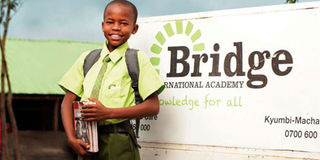Low-cost Bridge schools hire 300 TSC-registered teachers

A pupil at Bridge International Academy in Nairobi. A total of 2,776 teachers applied for 300 teaching vacancies that were recently advertised by the international chain of private schools that operates in low-income areas across the country. PHOTO | FILE
A total of 2,776 teachers applied for 300 teaching vacancies that were recently advertised by an international chain of private schools that operates in low-income areas across the country.
On Wednesday, Bridge International Academies said the candidates have been interviewed and are now set to be deployed to various schools across the country.
Teachers who have been recruited are registered by Teachers Service Commission (TSC) as per the regulations, which demands that anyone who wants to teach in private or public schools must first be registered with the commission.
The decision to hire the teachers is in compliance with new regulations by the ministry of education on informal schools.
The head of communications at the academies, Jackie Walumbe, said about 49 per cent of the applicants were P1 trained teachers, about 13 per cent were ECDE trained and about 22 per cent had Bachelor’s degree in Education.
“The recruitment drive has largely been successful and we have many candidates who are very excited about the opportunity and are yearning to be part of great educators at Bridge International Academies,” said Ms Walumbe.
The organisation operates 405 private primary and nursery schools with a population of about 100,000 pupils.
HIGH PROFILE ORGANISATIONS
The academies are funded by high-profile organisations, including the World Bank Group, the Commonwealth Development Corporation and Omidyar Network.
In January this year, the Ministry of Education issued new that requires informal schools to employ at least 30 per cent of trained and registered teachers.
The untrained teachers were required to have a minimum of C (plain) in KCSE and undergo in-service training within the first three years of their employment.
Statistics indicate that more than 1.9 million children in Kenya aged six to 13 years do not attend school and another 2.7 million aged 14-17 years have suffered the




